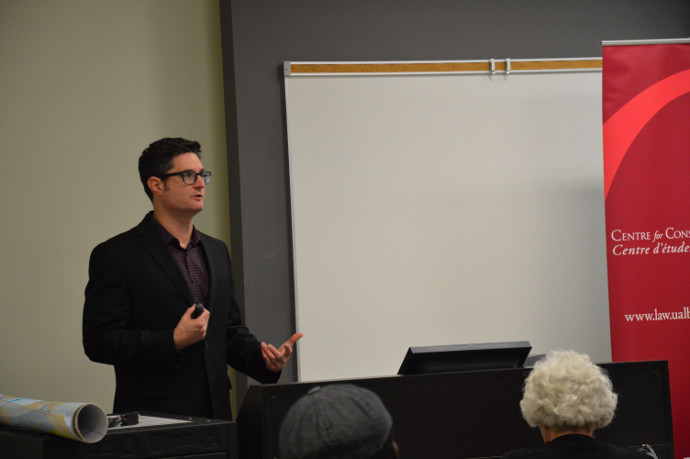
UAlberta Law's Professor Steven Penney captured the attention of a standing-room-only audience on January 19 during the latest installment of the Centre for Constitutional Studies' Downtown Charter Series.
The audience - which included members of the public, students, law enforcement officers, and lawyers - gathered at Enterprise Square to listen to Penney explain the scope of the right to counsel under section 10(b) of the Canadian Charter of Rights and Freedoms.
Penney gave a breakdown of how this specific section of the Charter works by pointing the audience to the specific wording of section 10(b), which reads "Everyone has the "right on arrest or detention…to retain and instruct counsel without delay and to be informed of that right."
Penney's presentation - which included the use of humorous illustrations and memes - broke down section 10(b) into three segments. First, he explained that the right to speak to a lawyer is only available "on detention" - that is, if an individual is arrested or detained. He reviewed the types of detention, including both physical and psychological detentions, which may trigger this right. Once an individual invokes this right to counsel on detention, the police have responsibilities to assist the person who is arrested or detained and to provide them a reasonable opportunity to locate a lawyer and obtain advice. Finally, he spoke about what it means to be informed of this right, where he made a comparison of U.S. Miranda warnings to current Canadian law.
The right to counsel is an important one because of how it relates to the right to remain silent and to not provide self-incriminating evidence.
Penney provided examples of the type of information police must give to people when they are detained; the degree of understanding detainees must have to be said to have been "informed" of their rights; what is required for detainees to invoke their right to talk to counsel; and what must police do, and refrain from doing, to facilitate access to counsel after the right is invoked.
During the question-and-answer portion of the presentation, Penney was asked about the distinction between the rights people are allowed to invoke and the realities on the ground where individuals may fear invoking their rights if it will make them appear hostile. Penney acknowledged that this tension is a difficult reality, especially given unfortunate statistics of young Aboriginal and black males being more likely to be stopped by police than white men and women.
Penney was also asked about what would happen if the accused were unable to reach their preferred lawyer, and about the type of language used by the Edmonton Police Service during an arrest.
Interestingly, Penney pointed out that while everyone has the right to speak to a lawyer, many people waive their right or choose not to speak to a lawyer, despite the serious circumstances they may be facing.
Next up for the Downtown Charter Series on February 15, 2017 is Assistant Professor Ubaka Ogbogu on Section 7 and the right to assisted dying. The talk begins at 12 pm at Enterprise Square (10230 Jasper Avenue) in Room 2-926.